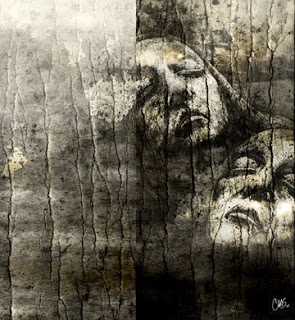 This week I read one of the most powerful sermons I’ve ever encountered. It was written by Arthur John Gossip the day after his wife passed away very suddenly, and unexpectedly. It is entitled “But When Life Tumbles In, What Then?”
This week I read one of the most powerful sermons I’ve ever encountered. It was written by Arthur John Gossip the day after his wife passed away very suddenly, and unexpectedly. It is entitled “But When Life Tumbles In, What Then?”
In this image Gossip stands up and invites the congregation through the dark torrents of despair, pain and confusion. He weaves the image of the Jordan flooded, cold, dreadful and terrifying throughout an onslaught of raw humanity. He shows us Christ’s own suffering at the thought of his calling, the anger of the prophets, the shadows of Dante, and the image of a God who seems as if he steps on us as ants. There is pain dripping from his words, just as our lives in the torment of grief can feel undone, betrayed, and meaningless.
Religion is often entered into some sort of contract. All is well while God runs parallel to our own ambitions and desires, however when people in deep pain turn to God they often find in their time of greatest need he has parted ways with them. At this point a question must be asked. Is God uncaring? Cruel? or is he faithful? It is at this point our religion is tested, where we see if our love for God is simply a “fair-weather affair.”
The crux of Gossip’s message hangs on his statement,
“I do not understand this life of ours. But still less can I comprehend how people in trouble and loss and bereavement can fling away peevishly from the Christian faith. In God’s name, fling to what? Have we not lost enough without losing that too?”
We do not have a God who is indifferent to our suffering. Along with images of pain and confusion Gossip talks about a painting of Christ crucified, subtle in the background is God’s form supporting Christ, and a face in greater agony then the savior’s own. We have a God whose grace is known best not in times of spring, but in times of winter.
To forfeit one faith at a time of suffering is to forfeit the only hope which can carry us across the raging deluge. Gossip knows this better then I ever had, and closes with these words:
“I don’t think you need to be afraid of life. Our hearts are very frail, and there are places where the road is very steep and very lonely, but we have a wonderful God. And, as Paul puts it, ‘What can separate us from his love? Not death,’ he writes immediately. No, not death, for standing in the roaring of the Jordan, cold with its dreadful chill and very conscious of it terror, of its rushing, I, too, like Hopeful in Pilgrim’s Progress, can call back to you who one day in your turn will have to cross it, “Be of good cheer, my brother, for I feel the bottom and it is sound.”












